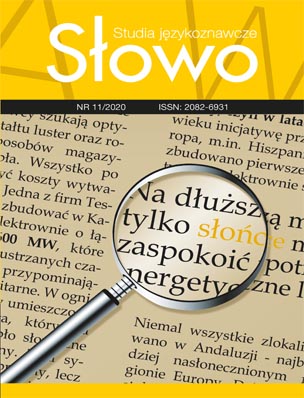Jak studenci nazywają Ukraińca i Polaka (na materiale danych ankietowych z ośmiu polskich uniwersytetów)
DOI:
https://doi.org/10.15584/slowo.2020.11.6Słowa kluczowe:
ways of calling a Pole, ways of calling a Ukrainian, Polish students, surveyAbstrakt
The article is devotedtothewaysinwhich Polish studentscalla Poleanda Ukrainian. The researchers (2390 surveys) wereconductedamong 1195 students from 8 Polish universities: Rzeszów University, University of Silesia, University of Wrocław, Jagiellonian University, Universityof Lodz, Adam Mickiewicz University in Poznań, Nicolaus Copernicus University in Toruń and Maria Curie- Skłodowska University in Lublin. Theresearchmaterialcovers a totalof 2946 units. Asequivalentsofthewords Pole/Ukrainian, studentsgivenamesofgeographicalcategorization–mieszkaniec Polski/ mieszkaniec Ukrainy and of politicalcategorization – obywatel Polski/obywatel Ukrainy and others. Toname a Pole, theyproposethewordsrodak, krajan, naszrealizingthe„native-foreign”opposition. There are oftenequivalentsofresearchedethnonymsintheformofdiminutives, metaphorsandanthroponyms, e.g. Polaczek, patriota, cebulak, cebula, Janusz, Grażyna, Lach. Calling a Ukrainian, such student terms dominate: sąsiad, obcokrajowiec, cudzoziemiec, rusek, ruski, Ukrainiec and others. The definition of a Ukrainian as a neighbor appears more often in the group of students from Rzeszów and Lublin and rarelyfrom Poznań, Katowice, Wrocław, Toruń, Kraków and Łódź. The spaсу location of Toruń, Łódź, Poznań and Wrocław in the West of Poland determines the perception of a Ukrainian by the students from these cities in the category East – West: ci ze wschodu, osoba ze wschodniej granicy, osoba ze Wschodu and others. Thus, the place of residenceof stereotype carriers determines the character of these latter.Downloads
Bibliografia
Bartmiński J., 2006, Semantyka i polityka. Nowy profil polskiego stereotypu Ukraińca [w:] Przemiany języka na tle przemian współczesnej kultury, red. K. Ożóg, E. Oronowicz-Kida, Rzeszów, s. 191–211.
Bartmiński J., 2007, Językowe podstawy obrazu świata, Lublin.
Bartmiński J., 2014a, Ankieta jako pomocnicze narzędzie rekonstrukcji językowego obrazu świata [w:] Wartości w językowym obrazie świata Słowian i ich sąsiadów, t. 3: Problemy eksplikowania i profilowania pojęć, red. I. Bielińska-Gardziel, S. Niebrzegowska-Bartmińska, J. Szadura, Lublin, s. 279–308.
Bartmiński J., 2014b, Wybrane koncepty w świetle danych ankietowych: Europa, Europejczyk, ojczyzna, Polska, Polak, świat, Wschód, Zachód [w:] Polskie wartości w europejskiej aksjosferze, red. S. Niebrzegowska-Bartmińska, M. Nowosad-Bakalarczyk, S. Wasiuta, Lublin, s. 248–308.
Broniarek W., 2005, Gdy ci słowa zabraknie. Słownik synonimów, Warszawa.
Fylype͡ ts′ O., 2019a, Avtostereotyp poli͡ aka i heterostereotyp ukrain′ci͡ a v seredovyshchi toruns′kykh studentiv [w:] Z bliska i z daleka. Język polski w badaniach językoznawców lwowskich i toruńskich, red. M. Gębka-Wolak, A. Krawczuk, Toruń, s. 217–234.
Fylype͡ ts′ O., 2019b, Etnostereotypni ui͡ avlenni ͡ a pro poli ͡ aka i ukrain′ci͡ a sered studentiv Zheshivs′kogo universytetu (kriz′ pryzmu asotsiatsiĭ iz predmetamy), „Zeszyty Naukowe Prac Ukrainoznawczych”, nr 3, s. 155–165.
Fyłypec O., 2020, Najnowszy stereotyp Ukraińca w środowisku studentów poznańskich i lubelskich [w druku].
Krawczuk A., 2008, Nowe profile ukraińskiego stereotypu Polaka (na podstawie ankietowania studentów lwowskich), „Postscriptum Polonistyczne”, nr 1 (1), s. 147–170.
Pacławska E., 2009, Ukrainiec w oczach studentów na wschodzie i zachodzie Polski [w:] Stereotypy w języku i w kulturze, red. S. Niebrzegowska-Bartmińska, S. Wasiuta, Lublin, s. 65–80.
Szadura J., 1993, Z badań nad autostereotypem Polaka: kryteria polskości [w:] Nazwy wartości: studia leksykalno-semantyczne, red. J. Bartmiński, M. Mazurkiewicz-Brzozowska, Lublin, s. 239–256.
Pobrania
Opublikowane
Jak cytować
Numer
Dział
Licencja
Prawa autorskie (c) 2020 Słowo. Studia językoznawcze

Utwór dostępny jest na licencji Creative Commons Uznanie autorstwa – Użycie niekomercyjne 4.0 Międzynarodowe.


